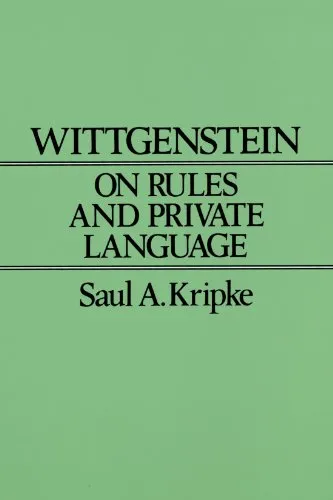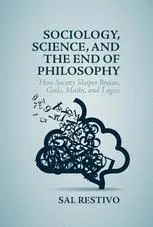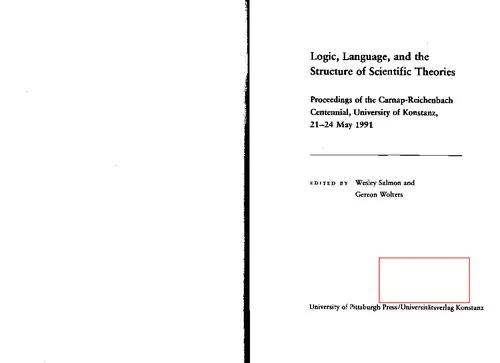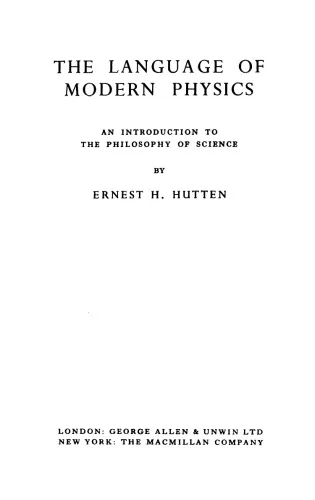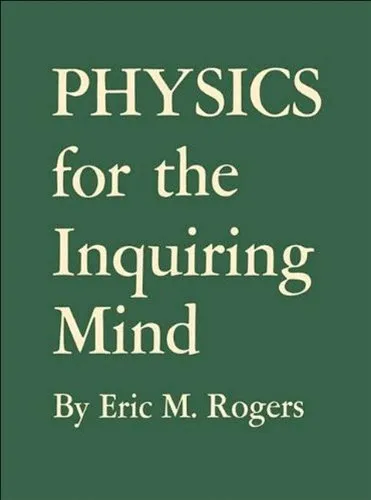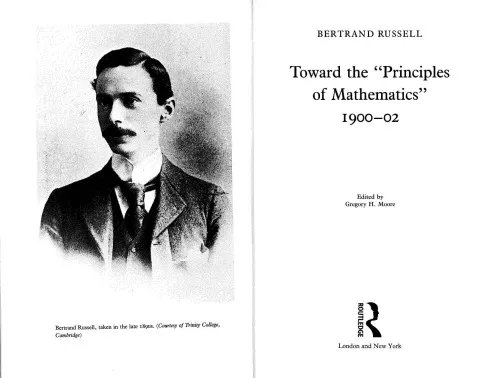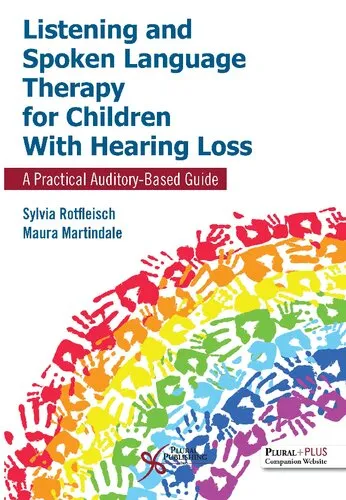Wittgenstein on Rules and Private Language: An Elementary Exposition
4.0
بر اساس نظر کاربران

شما میتونید سوالاتتون در باره کتاب رو از هوش مصنوعیش بعد از ورود بپرسید
هر دانلود یا پرسش از هوش مصنوعی 2 امتیاز لازم دارد، برای بدست آوردن امتیاز رایگان، به صفحه ی راهنمای امتیازات سر بزنید و یک سری کار ارزشمند انجام بدینکتاب های مرتبط:
معرفی کتاب: ویتگنشتاین در مورد قواعد و زبان خصوصی: یک توضیح مقدماتی
خلاصهای جامع از کتاب
کتاب "Wittgenstein on Rules and Private Language: An Elementary Exposition" نوشتهٔ سال آ. کریپکی، به طور عمیق به تحلیل یکی از چالشبرانگیزترین و بحثانگیزترین مباحث فلسفی ویتگنشتاین میپردازد: مسئلهٔ قواعد و امکانپذیری زبان خصوصی. کریپکی در این اثر با دقت و ظرافت به بررسی تفسیر خود از استدلالهای ویتگنشتاین در فلسفهٔ قواعد میپردازد. کتاب با استفاده از نگرشها و روشهای نوین فلسفی سعی دارد به این سؤال پاسخ دهد که آیا میتوان قواعد را به صورت خصوصی و بدون ارتباط با جامعهٔ فرهنگی تعریف کرد یا خیر.
نگرش کریپکی نسبت به نوشتههای ویتگنشتاین، که گاه به عنوان "تفسیر کریپکی" معروف است، به ویژه بر مشکلی معروف به "Skeptical Paradox" متمرکز میشود. این تفسیر به گونهای است که ویتگنشتاین به ما نشان میدهد که چگونه معنا و فهم قواعد اساساً به اجتماعی بودن و تعاملات زبانی وابسته است.
مطالب کلیدی
- تحلیل دقیق از مفهوم قواعد زبانی و نقش آنها در ارتباطات اجتماعی.
- نقد و بررسی امکانپذیری زبان خصوصی از منظر فلسفی و جامعهشناسی.
- معرفی پارادوکس شکاکانه و نوشخیریزی در متن فلسفی مدرن.
- پرسش از اهمیت قواعد اجتماعی در تعیین معنا و فهم متون زبانی.
جملات معروف از کتاب
"مباحث ویتگنشتاین نه تنها درباره قواعد است، بلکه به نحوی عمیقتر درباره آنچه جامعه و تعامل اجتماعی برای معناداری ذهنی ما به همراه دارند، میباشد."
"قواعد بدون اجتماع، همچون بستری برای زبان هستند که هرگز به شکوفایی نخواهند رسید."
چرا این کتاب مهم است
این کتاب برای دانشجویان و محققان فلسفه با گرایش به فلسفه و زبان ویتگنشتاین بسیار مهم است. بحثی که کریپکی در این اثر مطرح میکند، بر روی نقش قواعد در بنا نهادن و فهمیدن معنا و ارتباط آن با جامعه، بیشتر مشخص میکند که قواعد چگونه میتوانند در سایهٔ تعاملات اجتماعی معنا یابند.
علاوه بر این، این کتاب با معرفی مفاهیم پیچیدهای همچون Skeptical Paradox به خوانندگان کمک میکند تا نگاهی تازه به فلسفه ویتگنشتاین بیفکنند و با رویکرد طبقهبندی شده و منظم، نقشهای برای فهم دقیقتر نظریههای زبانی ویتگنشتاین بکشند. این اثر به عنوان مرجعی مهم در مباحث فلسفی و زبانی شناخته شده است.
Welcome to the world of one of the most profound expositions on Ludwig Wittgenstein's later philosophy. 'Wittgenstein on Rules and Private Language: An Elementary Exposition', written by Saul A. Kripke, delves into the heart of linguistic philosophy, exploring the enigmatic concepts articulated in Wittgenstein's later works, especially the 'Philosophical Investigations'. This book challenges traditional interpretations and offers a revolutionary view that has spurred significant philosophical discussions.
Detailed Summary of the Book
In 'Wittgenstein on Rules and Private Language', Kripke provides an accessible yet deeply analytical interpretation of Wittgenstein’s ideas. The book is centered around what has famously come to be known as 'Kripkenstein', a philosophical paradox that questions the very nature of following rules and meaning in language. Kripke describes how Wittgenstein's arguments dismantle the notion of a private language — that is, a language understandable by only a single individual. He argues that language inherently requires a community for the establishment and assessment of meaning.
Kripke reconstructs Wittgenstein's philosophical investigations, focusing specifically on rule-following as a practice. The key question examined is: What does it mean to follow a rule? This seemingly simple inquiry gives rise to profound implications about human understanding, knowledge, and the communal nature of language. By dissecting this paradox, Kripke leads us through intricate philosophical arguments that question conventional semantics, ultimately proposing that rules do not have a fixed interpretation but rather derive their meaning from communal agreement and practice.
Key Takeaways
- The interpretation of rules is not determined by a private or personal understanding, but through communal engagement and discourse.
- Wittgenstein's ideas challenge foundational beliefs about the certainty of language and meaning, suggesting that ambiguity and variability are inherent to linguistic communication.
- Language is intrinsically a social construct that requires shared human behaviors and interactions.
- Kripke's exposition offers a way to navigate Wittgenstein's complex ideas through logical clarity, encouraging further philosophical inquiry and debate.
Famous Quotes from the Book
Some of the most touching insights in Kripke's book include:
"The problem of meaning and rule-following is, in its essence, a problem about the nature of human community."
"Each person cannot have a private understanding, as if ‘hidden’ from others in a metaphysical sense; all understanding must be accountable to communal standards."
Why This Book Matters
Kripke's 'Wittgenstein on Rules and Private Language' is a pivotal work for anyone interested in philosophy, particularly those fascinated by the philosophy of language. It ignites critical analysis of how meaning is conferred by linguistic practices, stressing the importance of community in shaping knowledge and understanding. The book's insights into the nature of human communication resonate not only in philosophical circles but also in various disciplines that grapple with concepts of understanding and interpretation, such as cognitive science, linguistics, and sociology. Furthermore, it invites philosophical enthusiasts to reevaluate established interpretations of Wittgenstein’s work, keeping his ideas alive and relevant in contemporary discourse.
دانلود رایگان مستقیم
شما میتونید سوالاتتون در باره کتاب رو از هوش مصنوعیش بعد از ورود بپرسید
دسترسی به کتابها از طریق پلتفرمهای قانونی و کتابخانههای عمومی نه تنها از حقوق نویسندگان و ناشران حمایت میکند، بلکه به پایداری فرهنگ کتابخوانی نیز کمک میرساند. پیش از دانلود، لحظهای به بررسی این گزینهها فکر کنید.
این کتاب رو در پلتفرم های دیگه ببینید
WorldCat به شما کمک میکنه تا کتاب ها رو در کتابخانه های سراسر دنیا پیدا کنید
امتیازها، نظرات تخصصی و صحبت ها درباره کتاب را در Goodreads ببینید
کتابهای کمیاب یا دست دوم را در AbeBooks پیدا کنید و بخرید
1398
بازدید4.0
امتیاز0
نظر98%
رضایتنظرات:
4.0
بر اساس 0 نظر کاربران
Questions & Answers
Ask questions about this book or help others by answering
No questions yet. Be the first to ask!
